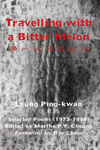![]()
TRAVELLING WITH A BITTER MELON
Selected Poems (1973-1998)
By LEUNG PING-KWAN
Hong Kong: Asia 2000, 2002. 320 pages, $23 (paperback)
reviewed by Brian Holton
How do we, on gaudy pictures of the past
Write words of the moment? Stuck in their midst, how do we paint
ourselves?
from "Postcards of Old," by P.K. Leung
translated by Martha Cheung
Poet, critic, and (under the pen name Ye Si) novelist P.K. Leung is a well-known figure in Hong Kong literary circles. Travelling with a Bitter Melon is his eighth major collection of poetry, a retrospective view of his work over a period of twenty-five years. The English translations are by a variety of hands, and the book is bilingual, with the Chinese and the English texts on facing pages.
Leung's poetry is delightful, full of surprises, fresh, witty and alive. He turns his attention to the often-unexamined details of ordinary lifefood and drink, the streets and odd corners of Hong Kong and of many other cities (he is a great traveler), roof repair, old postcards, falling leaves. Each poem has a warmth and an unassuming charm of the kind which is absent in much contemporary Chinese writing. His is a voice reminiscent of that same loving attention to detail found in, for instance, classical Chinese poems on everyday objects (yongwu shi), or the sly observation found so often as asides in traditional literary criticism or in 'random jottings' (biji). His voice is in and of Hong Kong, the city where he grew up, and in whose oddities he clearly takes great delight, as in the following lines from "Bird Street," translated by Michelle Yeh:
No, I am not challenging you from a local point of view.Perhaps the book should be recommended to expatriates in Hong Kong, who are too often caught up in the treadmill between office, home, and the narrow lanes of Lan Kwai Fong: P.K. Leung would be just the guide to open up that other Hong Kong that only natives know.
If I invent the simplicity of the native landin the tea-house
upstairs
There's blood from bird-fightingif I indulge in nostalgia,
It's not unlike your searching for exotica . . .
Most of the poems collected here are in free verse, but that tells you nothing of the marvelously inventive way in which P.K. Leung approaches the poetry. "A Wall Crumbles and Another Wall Comes Up," for example, is a monolithic block of wall-like text, while "Onion" is, well, onion-shaped. "Mussels in Brussels," " Still-Life," "The 1960s for Me," "Breakfast in Soho," to name just four examples, each form radically different shapes on the page, an indication of the versatility of the author and his willingness to experiment with form. "Han Dynasty Rubbing" (translated by Jane Lai), for example, is written in unvarying couplets of regular ten-syllable lines:
White papers pick up from bas-relief their eyes
Intent on the gradual resolution into white and black
An intimate dialogue, intricate negotiation between paper and
stone
Between ink-black and silvery-gray sweet modulation of
tone
Leung pays much attention to the music of the verse; he once admitted that he often thinks in Cantonese as he writes, which means that there is a faint but unmistakable Hong Kong accent to his Chinese. How to render nonstandard source-language ought to be an issue for a translator; yet I see no evidence of any attempt by any of the translators to do other than ignore the issue, which seems to me to be a net loss.
That minor quibble apart, the translations are generally very good, though occasionally betraying the mild stiffness and the lack of risk-taking that characterizes translators whose native language is not English (there probably isn't much to be done about this, while we wait for a new generation of translators whose native language is English to be trained). As might be expected from a collection that covers twenty-five years, various translators are involved. Martha Cheung, who edited the book and provides a witty and useful introduction, is one of them, though Jane Lai, John Minford, Michelle Yeh, and the author himself are all represented (this list is incompletethere are others, but the aforementioned have done the bulk of the translation). Professor Rey Chow provides a short but illuminating foreword, where P. K. Leung's work is related to the culture(s) to which it connects.
P.K. Leung is a skilled craftsman, a witty and precise observer of human nature and the natural world, and a unique voice in world poetry. Although he is well-known in Germany, in the English-speaking world he hasn't so far had the attention that he deserves. Perhaps through this refreshing and enjoyable book, which I hope will reach a wide audience, more readers will come to enjoy the quiet voice of a writer in full command of his medium, who can show you things you had never imagined, and give you a strong sense of the strangeness of everyday life.
Brian Holton, after teaching Chinese in the United Kingdom for fifteen years, now teaches translation at Hong Kong Polytechnic University. He has published many translations of Chinese literature.
